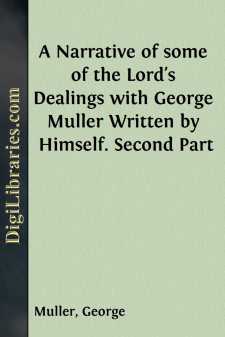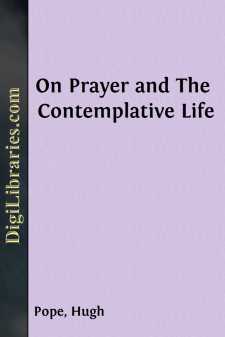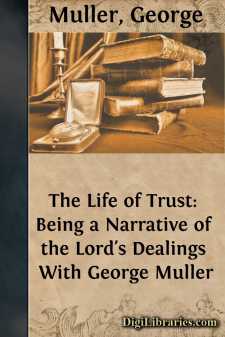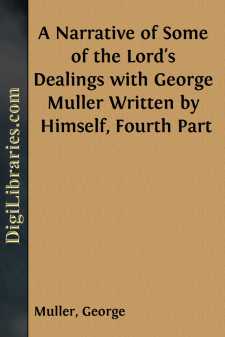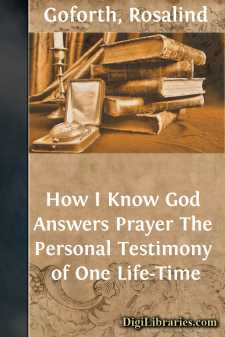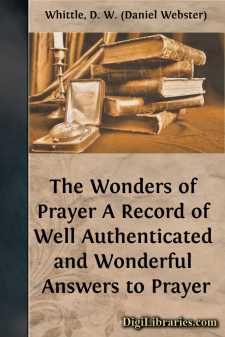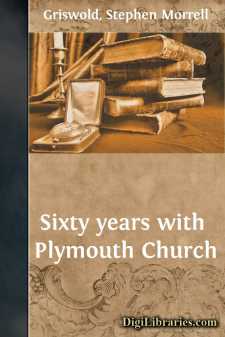Religion
- Agnosticism 2
- Antiquities & Archaeology 21
- Atheism 12
- Biblical Criticism & Interpretation 15
- Biblical Meditations 3
- Biblical Reference 1
- Biblical Studies 11
- Buddhism 8
- Christian Church 52
- Christian Education 5
- Christian Life 26
- Christianity 60
- Cults 2
- Devotional 6
- Eastern 2
- Education 4
- Eschatology 1
- Ethics 3
- General 60
- Gnosticism 1
- Hinduism 15
- History 28
- Holidays 10
- Inspirational 1
- Islam 8
- Judaism 3
- Leadership 1
- Meditations 3
- Monasticism 1
- Mysticism 11
- Philosophy 4
- Prayer 26
- Prayerbooks 5
- Religion & Science 12
- Sermons 54
- Spirituality 53
- Theism 2
- Theology 17
- Theosophy 15
Religion Books
Sort by:
by:
George Muller
THROUGH grace I am, in some measure, conscious of my many weaknesses and deficiencies; but, with all this, I know that I am a member of the body of Christ, and that, as such, I have a place of service in the body. The realization of this has laid upon me the responsibility of serving the church in the particular way for which the Lord has fitted me, and this has led me to write this second little...
more...
CHAPTER I. TWO SCENES.How delightful to step into the home where God is counselor of both parent and child! How blessed the companionship in such a home! There God counsels in sweet, tender tones. He teaches his will and gives the needed wisdom. God is man's truest and best teacher. James says, "If any of you lack wisdom, let him ask of God, that giveth to all men liberally ... and it shall be...
more...
by:
Hugh Pope
INTRODUCTION The pages which follow call for little introduction. S. Thomas has left us no formal treatise on Mystical Theology, though his teachings on this subject have been collected from his various works and combined to form such a treatise. Especially noteworthy is the work of the Spanish Dominican Valgornera. No such synthesis has been attempted here. We have simply taken from the Summa...
more...
by:
George Muller
EDITOR’S PREFACE. Having been requested by Messrs. Gould and Lincoln to examine the work entitled “A Narrative of some of the Lord’s Dealings with George Müller,” the Editor was convinced that its republication in this country would greatly promote the piety of American Christians. But to reproduce the work in its original form was attended with difficulty. The “Narrative,” in four parts,...
more...
by:
George Muller
PREFACE TO THE FIRST EDITION OF THE FOURTH PART Twelve years have elapsed since the period at which the third part of the Narrative of the Lord's dealings with me closes. It has not been for want of matter, that this fourth part has not appeared sooner; but the increased and ever increasing variety of other occupations has kept me hitherto from arranging the materials for the press. Of late,...
more...
by:
Rosalind Goforth
FOREWORDIT seems fitting that this little book of personal testimonies to answered prayer should have a brief introductory word as to how they came to be written. The question has been asked by some who read many of these testimonies as they appeared in the pages of The Sunday School Times: "How could you write such personal and sacred incidents in your life?" I could not have written them but...
more...
Introduction To First Edition. The incidents which are published in this volume, are vouched for upon the strongest proofs of authenticity possible to obtain, and are either of circumstances known amid my own experience, or connected with the lives of my correspondents and their friends. They are the thankful record and tribute to the power of persevering faith. Nothing has been published concerning...
more...
Introduction VERY soon after the decease of my beloved father-in-law I began to receive letters pressing upon me the desirableness of issuing as soon as possible a memoir of him and his work. The well-known autobiography, entitled "Narrative of the Lord's Dealings with George Müller," had been, and was still being, so greatly used by God in the edification of believers and the conversion...
more...
by:
Anonymous
The sky is dull and grey, Piercing and chill the blast, Each step resounds on the frosty ground, Winter is come at last. Mamma sits by the fire Her little ones round her knees. "How cosy we are, Mamma," they cry, "Tell us something, if you please." "Tell us about King Winter, And about Jack Frost, his man; We'll not be noisy or naughty at all, But as good as ever we can."...
more...
PREFACE For some years past I have been repeatedly urged to record my recollections of Plymouth Church and Henry Ward Beecher. One after another the original members of the church have passed away until now I am almost alone, so far as the early church connection is concerned, and I have been told that there is really no one left who could give the personal value to such a record. At first, as I...
more...


